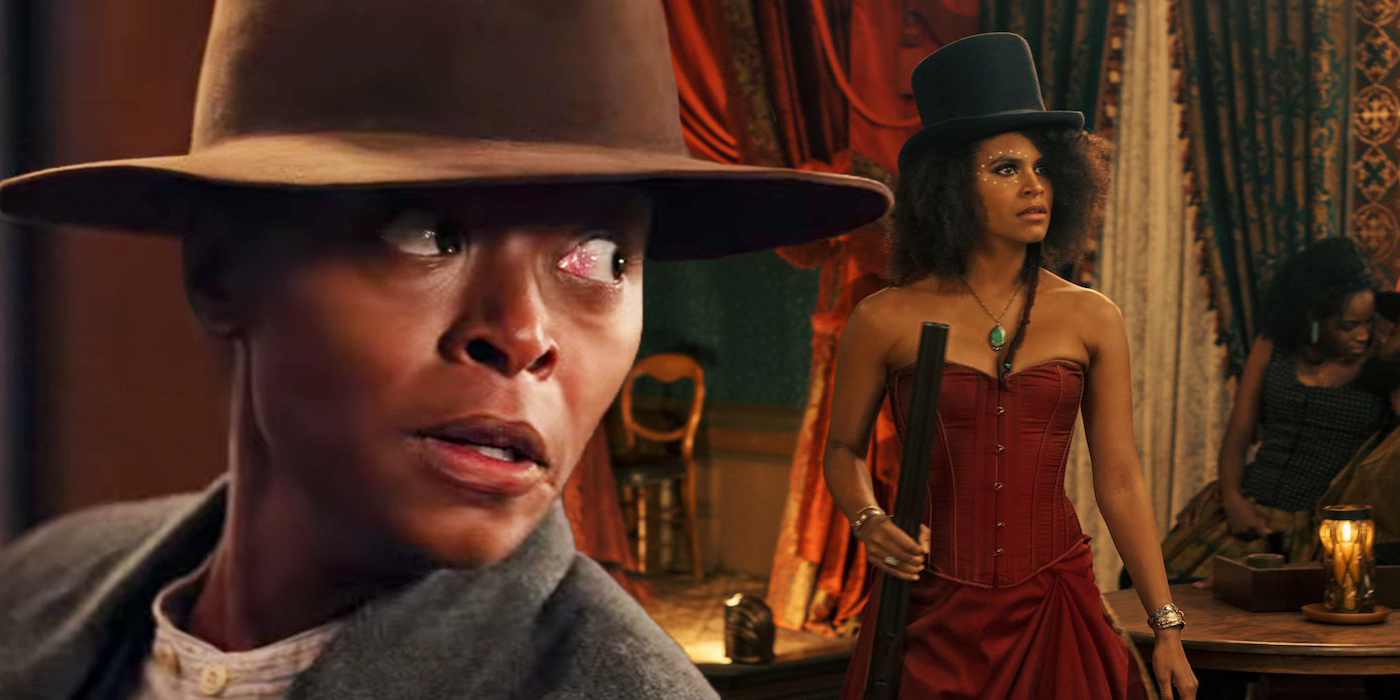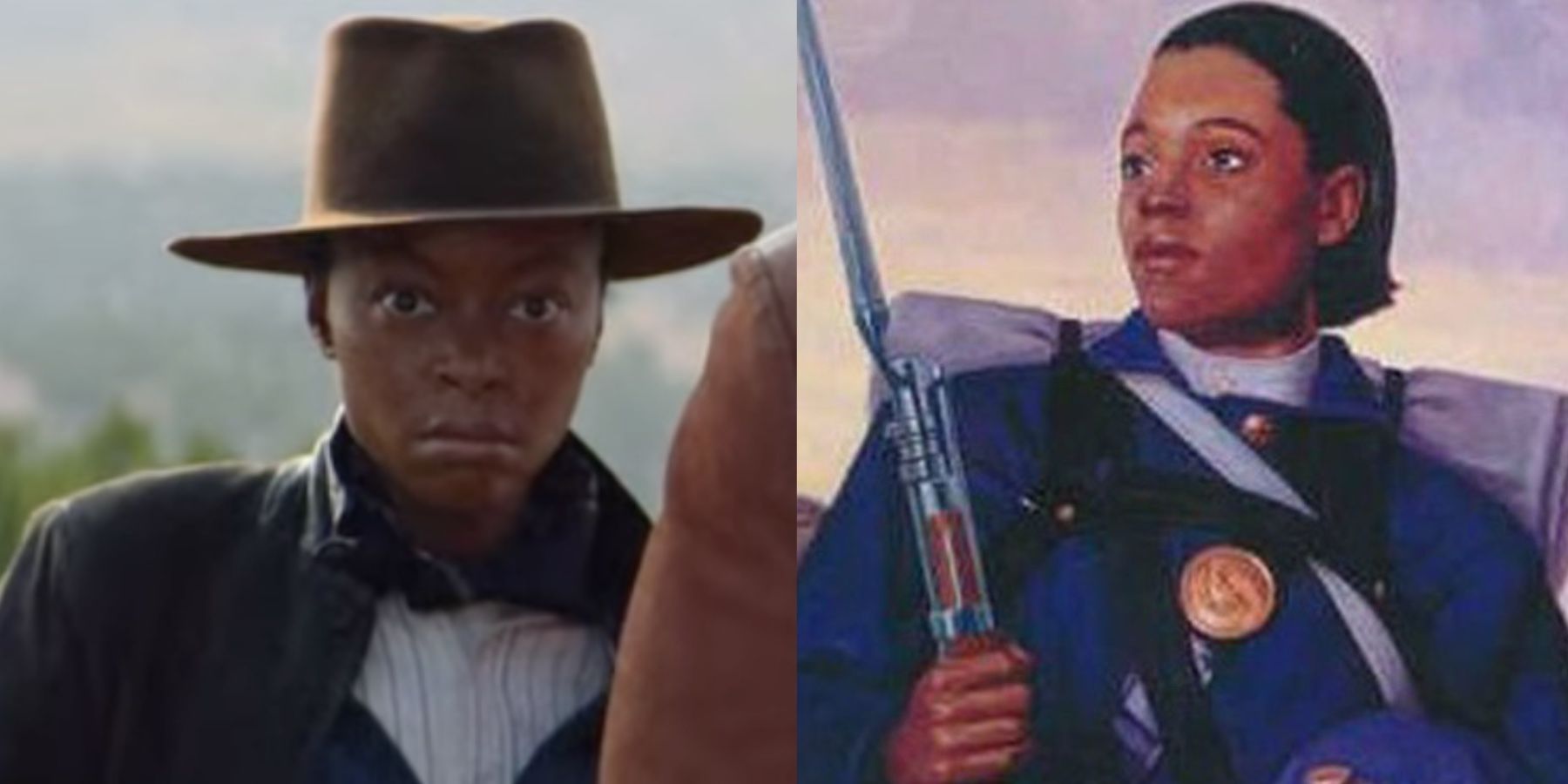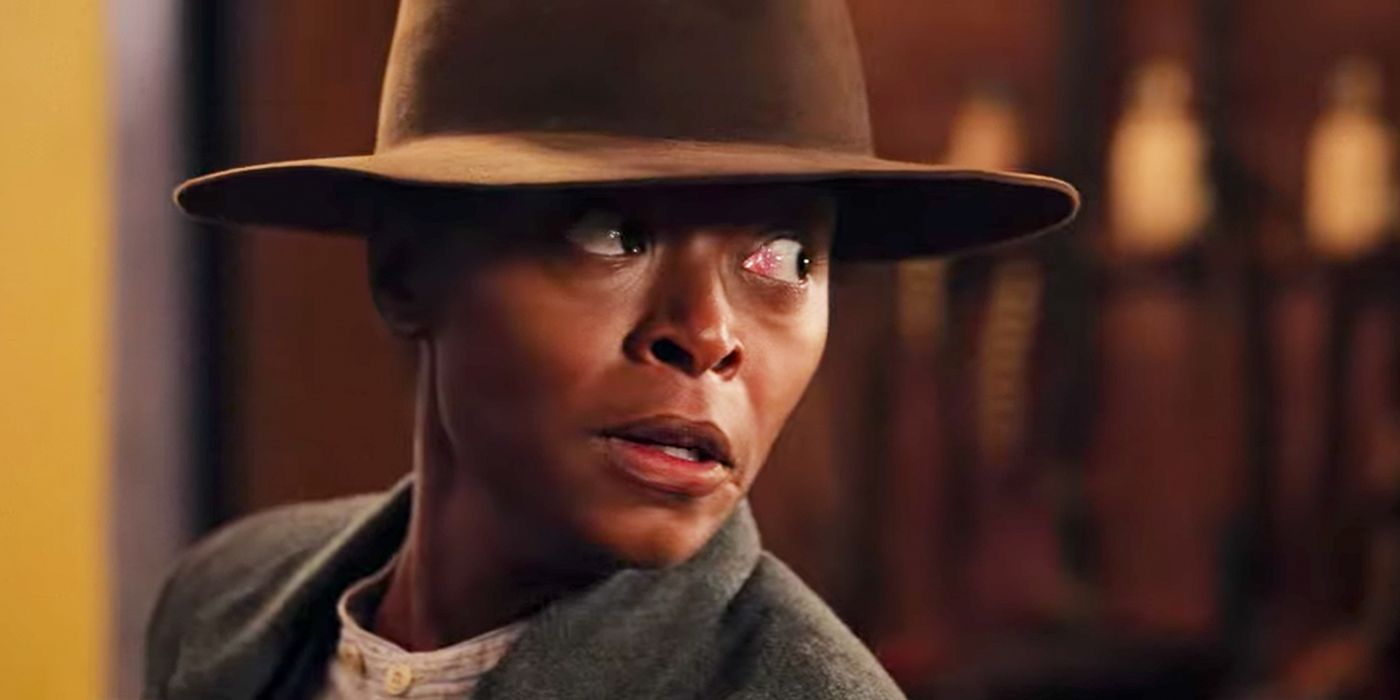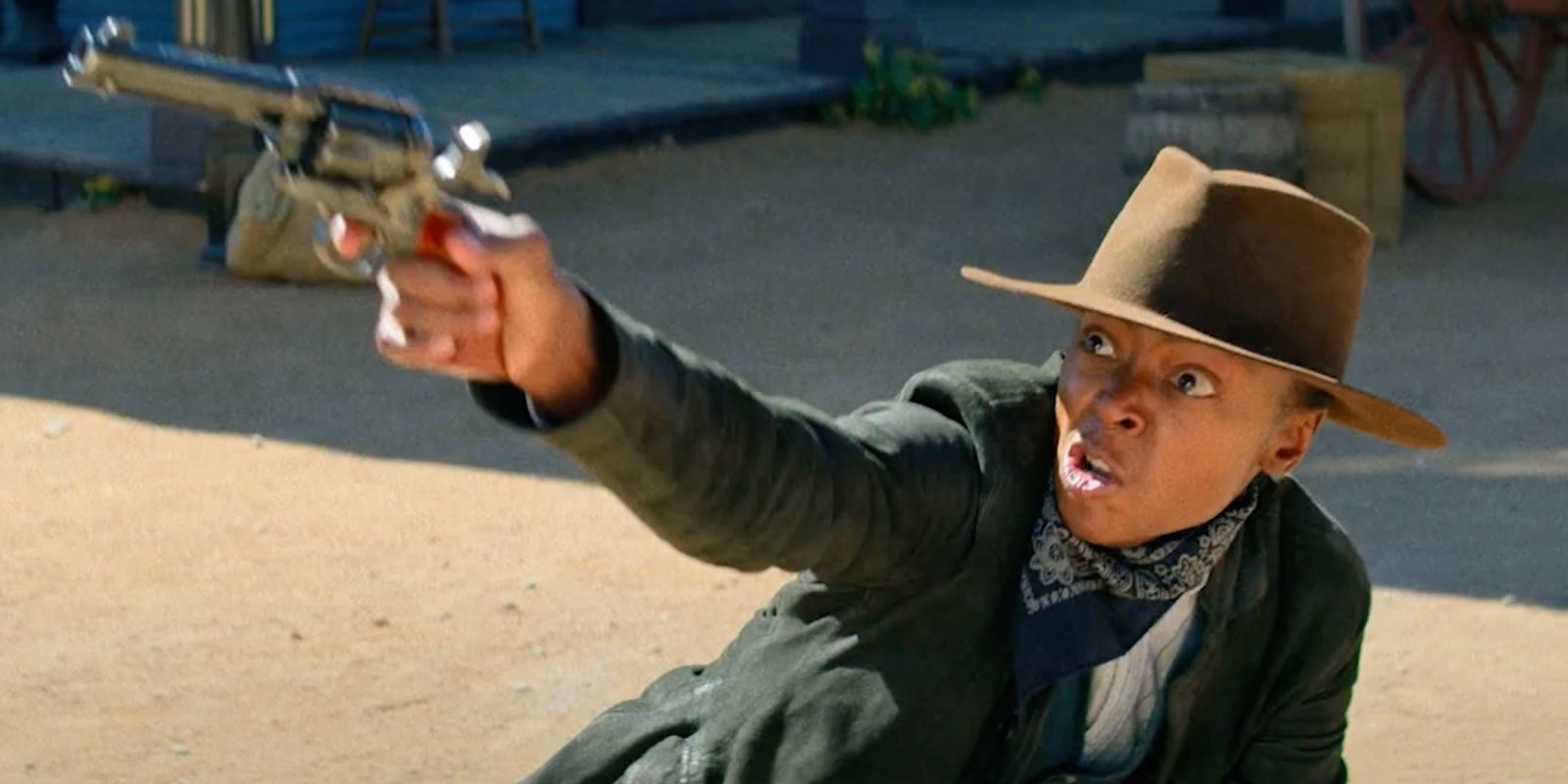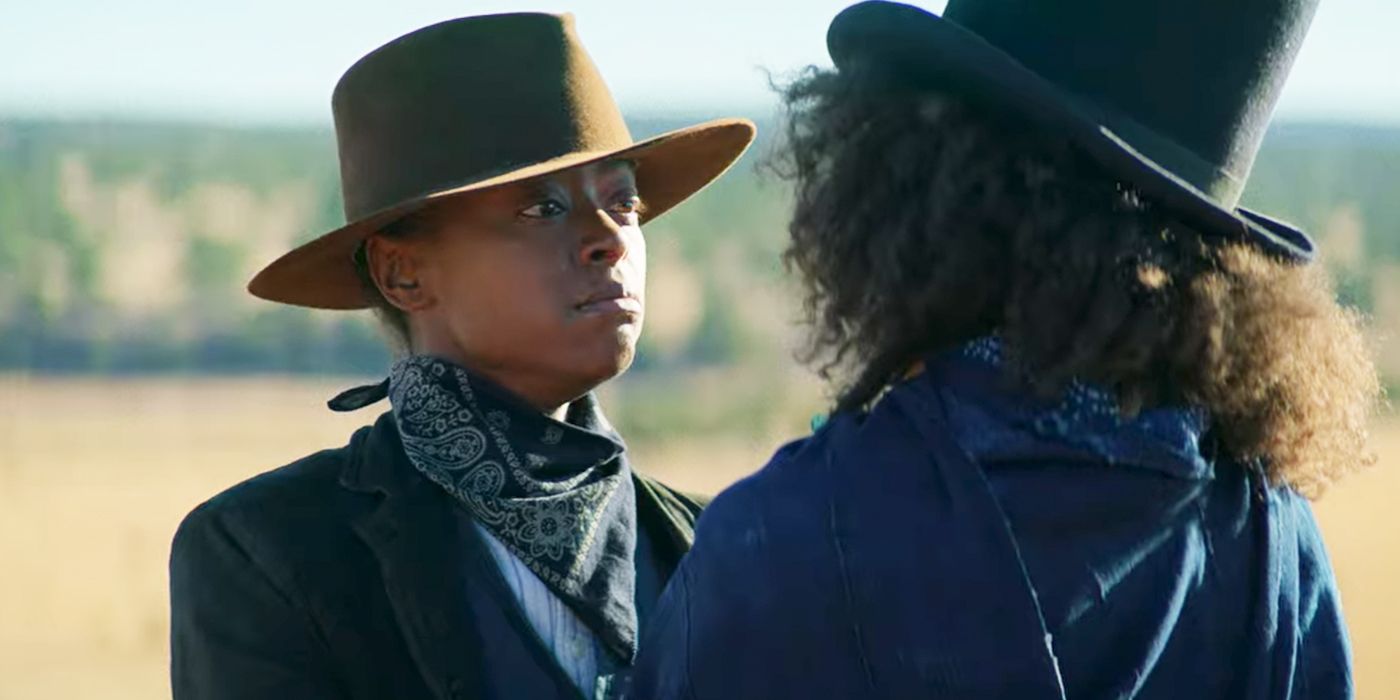Warning: Contains spoilers for The Harder They Fall.
Netflix’s The Harder They Fall included unexpected LGBTQ+ representation, primarily in the character of Cuffee. While complicated by the historical setting, the representation is largely positive. While The Harder They Fall plays fast and loose with historical accuracy, the acknowledgment that LGBTQ+ identities have always existed and gone through different struggles is important.
The Harder They Fall follows Nat Love (Jonathan Majors) and his gang as he seeks vengeance upon Rufus Buck (Idris Elba) for killing his father. When he arrives in Douglasville to meet up with Stagecoach Mary (Zazie Beetz), Nat is greeted at the door to her saloon by Cuffee (Danielle Deadwyler). Cuffee presents in a masculine or androgynous fashion for much of the movie and it is indicated that Cuffee has been in a romantic relationship with Stagecoach Mary.
There are a lot of complications with presenting certain LGBTQ+ identities in a piece based loosely on history at a time when the same language and conventions used today weren’t in place. While The Harder They Fall doesn’t do a perfect job in its representation, it handles its challenges well and the presence of the representation here speaks to the progress in overall queer representation in mainstream media. Here’s how The Harder They Fall explores LGBTQ+ identities, the struggles the movie faces in doing that, and how it handles those difficulties.
Cuffee Is Based On Cathay Williams
As confirmed when Nat Love asks Cuffee for their birth name when they are in Maysville, Cuffee is based on a real woman who lived in the 1800s: Cathay Williams. In her early life, Cathay Williams was an enslaved worker on a plantation in Missouri. During the start of the Civil War, Union forces occupied the city she worked in. At the time, the Union considered captured enslaved persons to be “contraband” and forced Williams to work in support roles for the army. Williams is known to have served as both a cook and a laundress.
After the Civil War, on November 15, 1866, Cathay Williams broke the prohibition that was in place against women serving in the military and enlisted in the army disguised as a man, using the name William Cathay. While many women served in various forms of the United States military over the years, Cathay Williams is the first documented African American woman to enlist. Her friend and her cousin, fellow soldiers in the regiment, were the only two who are known to have been aware of her true identity, similarly to how only a few people knew Cuffee's real identity in the Western revival The Harder They Fall. Throughout her enlistment, she passed cursory medical examinations and was treated for smallpox, but the doctors either did not notice her deception or declined to mention it. After being stationed in New Mexico, Cathay Williams became ill and a post surgeon eventually reported her to the post commander. She was subsequently honorably discharged on October 14, 1868.
Cathay Williams went on to marry a man, but the relationship was short-lived as he stole her money and a team of horses. She had her husband arrested and afterward moved to Trinidad, Colorado, where her military service became public knowledge and was published in The St. Louis Daily Times. She eventually applied for a disability pension based on her military service but, despite a precedent for approving such pensions for white women who had served in the military in disguise, Cathay Williams’ request was denied.
Cuffee Is Portrayed As Potentially Transmasc
In The Harder They Fall, Cuffee’s gender identity is never explicitly defined; pronouns are avoided and the only comment on gender in regard to Cuffee comes from Jim Beckwourth, who is portrayed as being insensitive at the time. (Note: as The Harder They Fall doesn’t provide pronouns for how Cuffee would like to be identified, this piece uses he/him as that is how the character presents to the world when it is his choice.) While it is possible that Cuffee is simply eschewing feminine stereotypes and roles for the time, there is a lot of evidence that supports a queer read of the character.
The name that Cuffee has taken on in place of his birthname is a traditionally masculine name from which originated in West Africa and was often used as a derogatory term for Black people. His reaction in The Harder They Fall to Nat Love asking what his “real” name is to assert that Cuffee is his real name in a manner that speaks to the deadnaming experiences of trans people rather than implying that "Cuffee" is simply a moniker he uses to survive in this world. Cuffee is also vehemently opposed to Nat Love’s plan to have him wear a dress and the idea of doing so seems to cause him almost physical pain. While The Harder They Fall might not be explicit about Cuffee being a trans man or nonbinary, the space is certainly left open for the LGBTQ+ community to see themselves represented on screen within the character of Cuffee.
Attributing Trans Identities To Historical Figures Is Complicated
The fact that The Harder They Fall does not explicitly state Cuffee’s gender identity is actually important for showing how media can handle trans identities. Cuffee is based on a real person and the language and acceptance of the time didn’t necessarily open the possibility for Cathay Williams to express how she identified in a way that matches the terms and definitions of gender identity used today. While it makes sense to present Cuffee as a person that presents as male and avoids feminine identification, given that these are documented behaviors of the person the character is based upon, retroactively attributing modern labels to The Harder They Fall's real historical figure who never claimed them presents some ethical problems. It is worth noting that Cuffee avoids gendering himself entirely in the closing scenes as he takes on a job with Bass Reeves (Delroy Lindo) noting “I always kinda wanted to be a deputy, sheriff, marshal person [emphasis added].”
How The Harder They Fall Handles LGBTQ+ Representation
The Harder They Fall walks a delicate line when it comes to LGBTQ+ representation. Nat Love deadnames Cuffee and the only indication that this is a bad thing is Cuffee’s own reaction. Similarly, Jim Beckwourth has a homophobic reaction to finding out that Cuffee was assigned female at birth as he notes he was scared that he had been falling for a boy–a moment that is played for laughs.
However, both of these moments serve historical purposes within The Harder They Fall, meaning that while they are still problematic, they are potentially justified from a narrative and worldbuilding perspective. Cuffee’s deadname needs to be brought up for the audience to be able to identify the historical figure that the character is based upon, and identifying it only to Nat Love restricts the number of people that have to know the name Cathay Williams, but it also leaves little room for rebuttal or a deeper discussion on the issue of deadnaming.
Similarly, Jim Beckwourth’s homophobic reaction to Cuffee in The Harder They Fall is presumably intended as a representation of the feelings toward LGBTQ+ identities at the time and is not supposed to be reflective of the writer’s or audiences’ views. This supposition that the film hopes to present LGBTQ+ representation in a positive light is supported by Stagecoach Mary’s farewell to Cuffee, which solidifies earlier indications that the two might have been romantically involved when they share a parting kiss. This means that either Cuffee is intended to be a trans man or nonbinary, and/or Stagecoach Mary is intended to be bi/pan. While Nat Love seems surprised by the kiss, no one else raises any problem with the situation. Mary preempts any discussion by admonishing Nat, saying “What you looking at? We got work to do, Mr. Love," The Harder They Fall demonstrating from a storytelling point of view that queer identities and relationships are not negative things, but natural.

